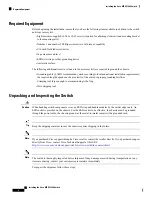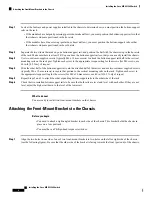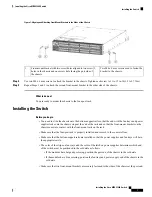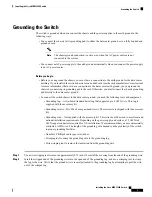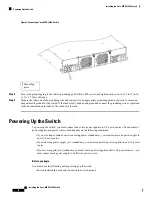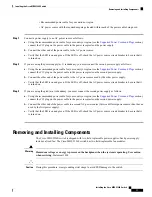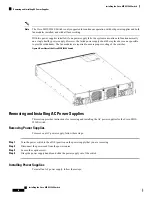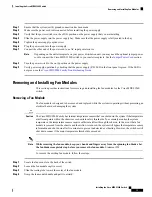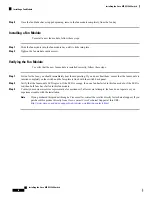
If the front cabinet mounting rails are not offset from the front door or bezel panel by a minimum of 3 inch
(7.6 cm), and a minimum of 5 inch. (12.7 cm), respectively, and cable management brackets are installed on
the front of the chassis, the chassis should be mounted rear-facing to ensure the minimum bend radius for
fiber-optic cables.
Note
Jumper power cords are available for use in a cabinet. For more information, see the
section.
Note
• Ensure the chassis is adequately grounded. If the switch is not mounted in a grounded rack, we recommend
connecting both the system ground on the chassis and the power supply ground to an earth ground.
• Ensure the site power meets the power requirements listed in the
section. If
available, you can use an uninterrupted power supply (UPS) to protect against power failures.
Avoid UPS types that use ferro-resonant technology. These UPS types can become unstable with systems
such as the Cisco MDS 9000 Family, which can have substantial current draw fluctuations because of fluctuating
data traffic patterns.
Caution
• Ensure that circuits are sized according to local and national codes.
For North America, the 300 W power supplies require a 20 A circuit. If you are using a 200 or 240 VAC
power source in North America, the circuit must be protected by a two-pole circuit breaker.
To prevent loss of input power, ensure the total maximum loads on the circuits supplying power to the switch
are within current ratings for wiring and breakers.
Caution
• As you install and configure the switch, record the information listed in the
section
• Use the following screw torques when installing the switch:
• Captive screws: 4 in-lb (0.45 N·m)
• M3 screws: 4 in-lb (0.45 N·m)
• M4 screws: 12 in-lb (1.36 N·m)
• M6 screws: 40 in-lb (4.5 N·m)
• 10-32 screws: 20 in-lb (2.26 N·m)
• 12-24 screws: 30 in-lb (3.39 N·m)
Installing the Cisco MDS 9396S Switch
3
Installing the Cisco MDS 9396S Switch
Installation Guidelines




